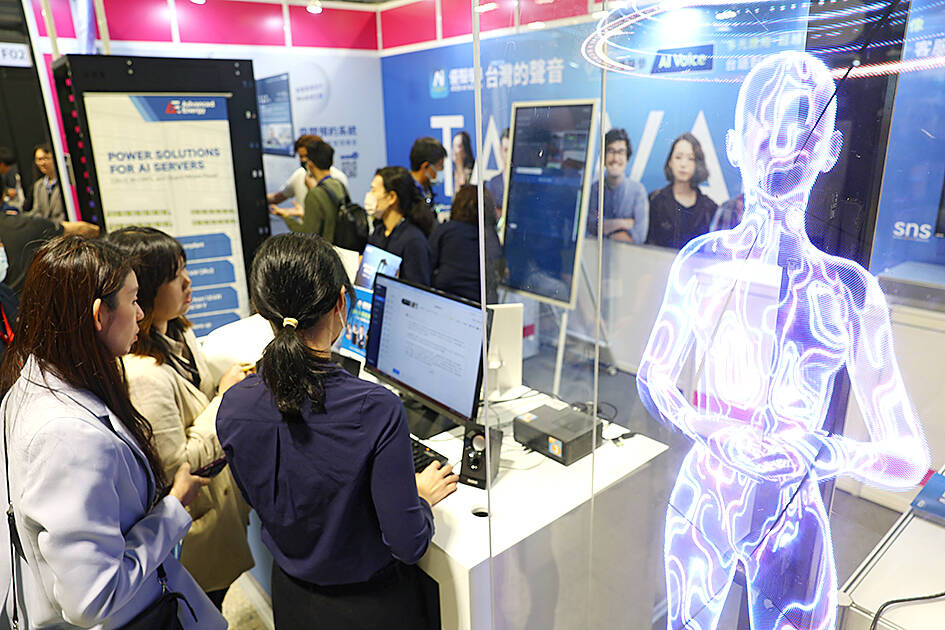The Ministry of Economic Affairs yesterday released the nation’s first white paper on the development of start-ups in Taiwan, including the domestic environment, recent policy achievements, and an overview of the overall entrepreneurial ecosystem.
As of the end of last year, 9,576 Taiwanese companies were listed on FINDIT, a government-backed start-up information platform, the ministry said in a statement.
The diverse products and services offered by these start-ups show the strong foundation the government has built for entrepreneurship, the ministry said.

Photo: CNA
According to Taiwan’s regulations, a start-up is a business that has a paid-in capital of less than NT$100 million (US$3.02 million), or hires less than 200 employees on a regular basis, and has been established for less than eight years.
The companies listed on FINDIT operate in a diverse range of businesses, including healthcare, media and entertainment, food and beverage, consumer goods, hardware manufacturing and software, the ministry said.
The most rapid growth of start-ups is in the fields of digital solutions and transformation with artificial intelligence (AI) and software, energy, sustainability and environment, the ministry said.
This reflected the government’s targeted support for strategic areas, including digital transformation, healthcare, semiconductors and AI, it said.
Energy, biotechnology and healthcare start-ups in Taiwan have been the most favored by investors, the ministry said.
Meanwhile, green energy, sustainability and carbon reduction business saw the largest increase in funding, Minister of Economic Affairs J.W. Kuo (郭智輝) said in the prologue of the white paper.
In 2023, energy start-ups attracted US$1.071 billion in investment thanks to the demand for energy saving, power storage, and power management solutions, the white paper said.
Companies in the biotechnology and health business received US$564 million in funding in 2023, FINDIT data showed.
Taiwanese start-ups generally place importance on research and development, as nearly 70 of them have technical staff and operate with technology development as their core business, the ministry said.
The white paper also has information regarding government support available to entrepreneurs, including subsidies, loans, investments and help attending trade events, the ministry said.

UNCERTAINTY: Innolux activated a stringent supply chain management mechanism, as it did during the COVID-19 pandemic, to ensure optimal inventory levels for customers Flat-panel display makers AUO Corp (友達) and Innolux Corp (群創) yesterday said that about 12 to 20 percent of their display business is at risk of potential US tariffs and that they would relocate production or shipment destinations to mitigate the levies’ effects. US tariffs would have a direct impact of US$200 million on AUO’s revenue, company chairman Paul Peng (彭雙浪) told reporters on the sidelines of the Touch Taiwan trade show in Taipei yesterday. That would make up about 12 percent of the company’s overall revenue. To cope with the tariff uncertainty, AUO plans to allocate its production to manufacturing facilities in

Taiwan will prioritize the development of silicon photonics by taking advantage of its strength in the semiconductor industry to build another shield to protect the local economy, National Development Council (NDC) Minister Paul Liu (劉鏡清) said yesterday. Speaking at a meeting of the legislature’s Economics Committee, Liu said Taiwan already has the artificial intelligence (AI) industry as a shield, after the semiconductor industry, to safeguard the country, and is looking at new unique fields to build more economic shields. While Taiwan will further strengthen its existing shields, over the longer term, the country is determined to focus on such potential segments as

TAKING STOCK: A Taiwanese cookware firm in Vietnam urged customers to assess inventory or place orders early so shipments can reach the US while tariffs are paused Taiwanese businesses in Vietnam are exploring alternatives after the White House imposed a 46 percent import duty on Vietnamese goods, following US President Donald Trump’s announcement of “reciprocal” tariffs on the US’ trading partners. Lo Shih-liang (羅世良), chairman of Brico Industry Co (裕茂工業), a Taiwanese company that manufactures cast iron cookware and stove components in Vietnam, said that more than 40 percent of his business was tied to the US market, describing the constant US policy shifts as an emotional roller coaster. “I work during the day and stay up all night watching the news. I’ve been following US news until 3am

COLLABORATION: Given Taiwan’s key position in global supply chains, the US firm is discussing strategies with local partners and clients to deal with global uncertainties Advanced Micro Devices Inc (AMD) yesterday said it is meeting with local ecosystem partners, including Taiwan Semiconductor Manufacturing Co (TSMC, 台積電), to discuss strategies, including long-term manufacturing, to navigate uncertainties such as US tariffs, as Taiwan occupies an important position in global supply chains. AMD chief executive officer Lisa Su (蘇姿丰) told reporters that Taiwan is an important part of the chip designer’s ecosystem and she is discussing with partners and customers in Taiwan to forge strong collaborations on different areas during this critical period. AMD has just become the first artificial-intelligence (AI) server chip customer of TSMC to utilize its advanced